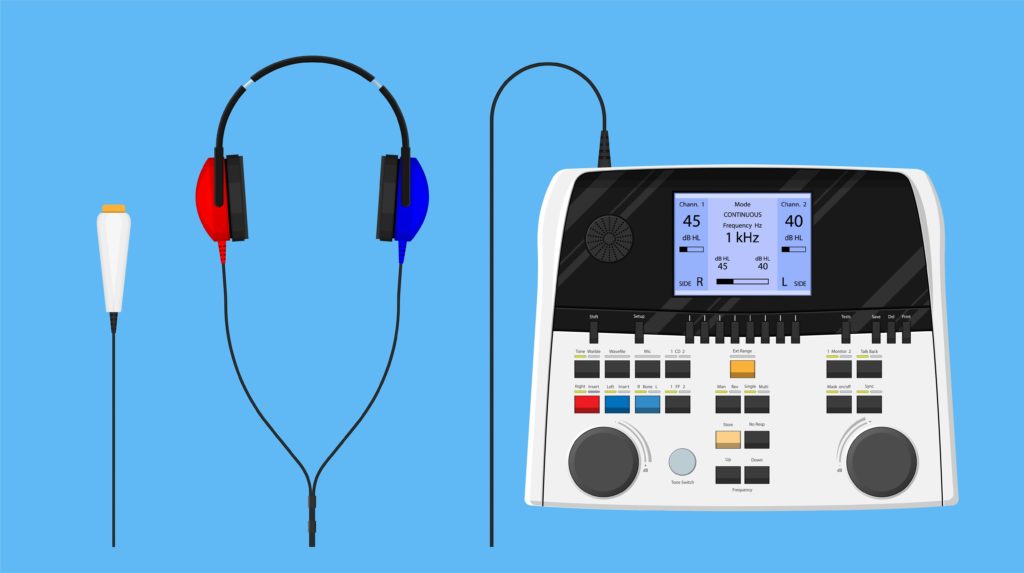Get a Hearing Test at MAE Audiological Services Inc to Prevent Issues
This quarter, our blog focuses on explaining why you should get a hearing evaluation. Hearing evaluations identify issues related to patients’ hearing health. Children sometimes get hearing tests at school. Adults tend only to check their hearing if they’re experiencing problems or have an underlying medical condition. At our office, our audiologist uses hearing tests to establish if a patient needs hearing aids. If the audiologist confirms hearing loss, she uses the hearing test results to determine the right device for that patient.
Why You Should Get a Hearing Evaluation (Hearing Evaluations 101)
Hearing tests usually take place in a quiet, soundproof space. Earphones, connected to a machine, deliver tones and different sounds of speech to patients’ ears, one ear at a time. Patients respond to the sound by raising a hand or pressing a button each time they hear a sound. Often, people assume hearing evaluations are only necessary for patients with hearing problems. However, hearing tests don’t just uncover hearing deficiencies. Hearing evaluations can reveal medical conditions unknown to you and serve to prevent those conditions from worsening. If a hearing test does reveal hearing loss, the results can also point the audiologist in the right treatment direction.
Hearing Tests Help Audiologists to Discover Various Medical Conditions
Generally, with aging comes hearing loss, but sometimes audiologists confirm hearing loss due to medical conditions. Some patients can relieve hearing loss by treating medical conditions revealed via a hearing test. Hearing evaluations usually uncover auditory medical conditions—issues related to the ear itself—like Cholesteatoma, Osteosclerosis, and Meniere’s Disease. Sometimes, hearing tests reveal hearing loss associated with non-auditory medical conditions.
Auditory Medical Conditions: Cholesteatoma, Osteosclerosis, and Meniere’s Disease
Cholesteatoma is a cyst that manifests in the middle of the ear after persistent ear infections. As it grows, the cyst usually becomes infected, causing hearing loss, plus dizziness or vertigo. Meniere’s disease also results in vertigo, often sudden attacks. Otosclerosis is an overgrowth of bone inside the middle of the ear which also causes hearing loss, vertigo, and tinnitus.
This is usually a hereditary medical condition. Hearing loss caused by this medical condition happens prior to middle age, typically between 11 and 30 years old. Meniere’s disease can also cause tinnitus (hearing persistent sounds like buzzing or ringing), and hearing loss, either temporary or permanent.
Non-Auditory Medical Conditions Associated with Hearing Loss
Non-auditory medical conditions associated with hearing loss include diabetes, osteoporosis, and multiple sclerosis (MS.) With diabetes, high blood glucose can damage blood vessels throughout the body, including inside the ear, resulting in hearing loss. Osteoporosis can cause softening of the middle ear’s bones and cause sudden hearing loss in one ear. Hearing loss can be one of the earliest symptoms of MS, as it’s a neurological medical condition.
Audiologists Use Hearing Evaluations to Help Patients Prevent Issues
Just like a vision test, an annual hearing evaluation allows patients to track changes in their hearing and make adjustments as necessary. Audiologists compare hearing test results to each other and try to prevent issues, like earwax buildup and noise-induced hearing loss. If these problems progress, patients can lose their hearing abilities. Patients can also develop depression and anxiety plus become increasingly isolated due to their limitations. Hearing loss can even lead to injuries resulting from not hearing car horns, smoke alarms, and other sounds signaling danger. In addition to hearing loss, audiologists can prevent issues with hearing test results like:
- Blood flow issues in the inner ear
- Side effects of prescription drugs
- Autoimmune disorders
- Inner ear nerve damage
- Pendred syndrome
In the End, Hearing Evaluations Help Audiologists Confirm Hearing Loss
Ultimately, audiologists use hearing tests to confirm hearing loss, specifically types like sensorineural or conductive (middle- or outer-ear.) Do you have difficulty understanding speech? Do you hear ringing or noises in your ears and/or your head? Have you had any recent drainage from one or both ears? Do you have pain or discomfort in one or both ears? These are some of the questions that audiologists might ask as part of a hearing evaluation. Whether to prevent issues or diagnose medical conditions, you should get a hearing test to impugn or confirm hearing loss. Get a pure-tone air and bone conduction hearing test, otoscopy, tympanometry, and more.
Types of Hearing Tests that Help Confirm Hearing Loss
Otoscopy; this is usually the initial aspect of a hearing evaluation. An otoscopy is the visual examination of the inner ear. Audiologists use an otoscope to shine a bright light and use magnification in the ear canal and tympanic membrane. Pure tone testing; this hearing evaluation is also called air conduction testing. Pure tone testing measures the sounds that go through the outer- and middle-ear. This hearing test is best conducted in a quiet space, so patients can hear different pitches and frequencies. Bone conduction testing; this hearing test determines if wax or fluid might be blocking the outer- or middle-ear.
Audiologists place a small device behind the patient’s ear or on the patient’s forehead. The device sends sound to the skull to gently vibrate the cochlea. Tympanometry; this hearing evaluation measures the movement and function of the middle ear and eardrum. Unless either are inflamed, this hearing test is generally quick and painless. Audiologists use tympanometers to change the ear canal’s air pressure as patients hear a low-pitched tone.
For more about why you should get a hearing evaluation, call MAE Audiological Services Inc at (724) 527–2228. Except for Thursdays and weekends, we are open 9 a.m. to 4 p.m. We are happy to share why you should get a hearing evaluation.
